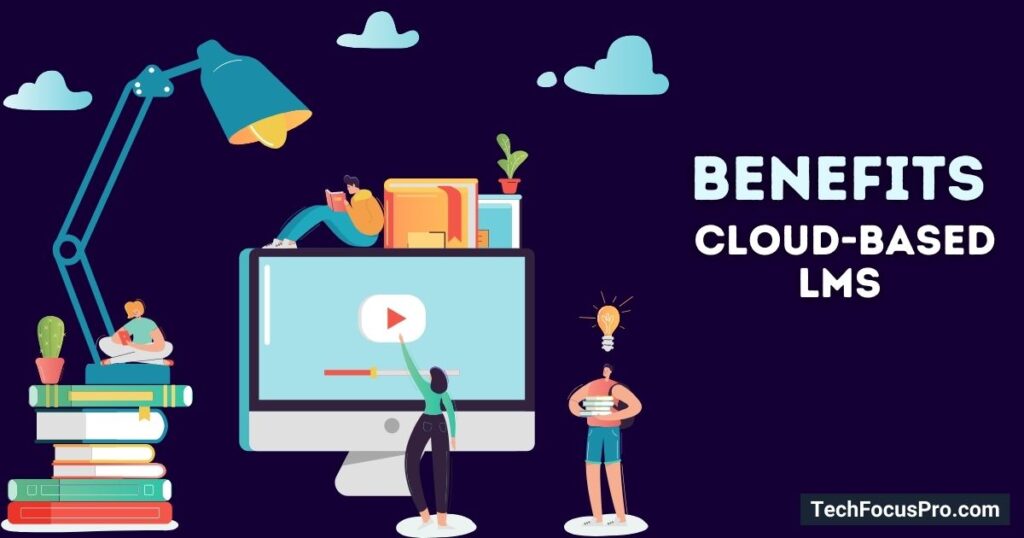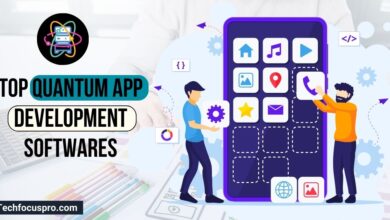What is the Future of Cloud-Based Learning Management Systems?

LMSs have become very important in today’s education system because they provide a flexible learning method.
Many schools and businesses are adopting these systems, especially after experiencing the benefits during the pandemic. As more people recognize their effectiveness, the use of LMS continues to grow.
In the coming sections, we will examine exciting future trends in cloud-based LMS. These may include personalized learning experiences, better mobile access, and advanced technologies like artificial intelligence that can make learning even more engaging and effective.
Understanding Cloud-Based Learning Management Systems
Cloud-based learning Management Systems, or LMS, are online platforms or software that help teachers and students manage the learning process. They allow users to access course materials, submit assignments, and communicate with each other from anywhere with an internet connection.
Recent Statistics on Cloud-Based Learning Management Systems
The latest statistics show that many organizations use cloud-based Learning Management Systems (LMS) for training and development. Here are some key points to consider:
- 2021-2022, training spending in the United States exceeded $100 billion.
- This increase in spending was partly due to companies investing in virtual training technologies, including LMS.
- In 2023, 39% of organizations plan to buy LMS to enhance their training programs.
- Additionally, 36% of companies want to purchase authoring tools and systems to create training content.
- Finally, 30% are looking to buy tools for developing training materials.
These figures highlight the growing importance of LMS in helping organizations develop their workforce effectively.
Source: Research.com
Growth of the Corporate LMS Market

One crucial detail to note is that from 2020 to 2024, the global corporate Learning Management Systems (LMS) market is expected to increase. It’s predicted to increase by 23% each year, which is relatively high.
By the end of this period, the LMS market is expected to reach around $12.48 billion in revenue. This growth shows how more and more companies see the value of using LMS to train their employees and improve their skills.
Future Trends of Cloud-Based Learning Management Systems
Personalized learning allows students to learn in a way that best fits their needs and at their own speed. Using a cloud-based learning management system, teachers can design classes that meet each student’s requirements and preferences.
Learning can be more efficient and enjoyable by enabling students who learn at different rates to succeed together.
Embracing Microlearning: The Power of Bite-Sized Content
Microlearning divides information into smaller, more palatable chunks. Students might use short films, tests, or articles that focus on a specific subject as an alternative to lengthy lectures. Students can learn anytime they have free time, which helps them understand difficult subjects without feeling overburdened.
Engaging with AI: Intelligent Learning Management Systems

Learning may be even more enjoyable with the use of artificial intelligence (AI). AI can evaluate student performance and recommend learning materials based on individual learning styles. For instance, the LMS may provide additional practice problems just for math if a student has difficulty with that subject. This clever aid facilitates students’ easier comprehension of challenging subjects.
Learning Made Fun: The Role of Gamification
Gamification is the use of game-like components to enhance learning. This can involve reaching goals, collecting achievement badges, or earning points. Students are more likely to remain engaged and motivated to study when enjoyable lessons add excitement to their learning process.
Prioritizing Safety: Enhanced Security in Online Learning
Safeguarding personal information is crucial as more education movie online. To safeguard user data, cloud-based LMS providers have focused on enhancing security protocols. This implies that educators and students can utilize these platforms without being concerned about disclosing or misusing their personal data.
Investing in Growth: Continued Professional Development (CPD)

Maintaining current knowledge of the newest instructional techniques and technological advancements requires instructors and trainers to engage in Continued Professional Development (CPD). A cloud-based learning management system (LMS) frequently offers tools and courses to help teachers advance their careers, raising the standard of instruction for students.
Seamless Learning with Integrated E-Learning Technologies
The integration of several e-learning resources makes a more seamless learning process possible. For instance, adding interactive simulations or virtual reality (VR) can enhance the reality and engagement of the lectures. Through technology, students can engage with the material meaningfully and learn it.
Collaborative Learning: The Benefits of Social Interaction
Students are encouraged to collaborate and share information through social learning. With cloud-based learning management systems, students, no matter where they are in the world, may quickly join study groups, work together on projects, and take part in conversations. This enhances learning through interaction and develops collaborative skills.
Flexibility for All: Scalable LMS as a Service
A scalable LMS allows businesses to modify it to fit their unique demands and size. A tremendous cloud-based learning management system (LMS) may grow with a school as its student body does without causing problems. This flexibility is crucial for businesses and educational institutions searching for long-term solutions.
Informed Choices: Leveraging Data for Better Learning Outcomes
Cloud-based LMSs gather extensive data about students’ learning processes. By examining this data, educators can decide which approaches are most effective for their students. Over time, instructors can enhance learning outcomes by modifying their teaching strategies based on understanding students’ engagement with the topic.
Benefits of Cloud-Based LMS

1. Accessibility and Convenience
Cloud-based Learning Management Systems provide unmatched accessibility. Users may log in from anywhere, at home, at work, or on the go.
This convenience supports a variety of learning scenarios, such as remote learning, hybrid models, and on-the-go training. This accessibility guarantees that learning doesn’t stop even in increasingly distant work and educational situations.
2. Cost-Effectiveness
The affordability of software like cloud-based LMS is among its attractive advantages. The initial hardware, software, and maintenance expenditures for traditional LMS solutions are frequently very high.
Contrarily, cloud-based solutions usually function on a subscription basis, which lowers upfront costs and offers predictable expenses.
Thanks to this pay-as-you-go model, organizations can expand their learning solutions to their needs and budgets.
3. Scalability
Platforms for cloud-based LMSs are made to scale quickly.
Cloud-based systems can handle variable loads without requiring significant infrastructure adjustments, whether you are managing a small team or a massive business with thousands of users.
This scalability makes it simple to handle growth and adapt to shifting organizational needs.
4. Automatic Updates and Maintenance
The service provider is in charge of updates and maintenance for cloud-based LMSs. This implies that customers won’t have to worry about keeping up with these upgrades and will always get access to the newest features and security improvements.
Automated upkeep contributes to the system’s continued dependability and security.
5. Enhanced Collaboration and Interaction
Group project capabilities, chat functions, and forums are just a few examples of the communication and collaboration options that cloud-based LMS platforms frequently offer. These tools enable communication between students and teachers, providing a more dynamic and exciting learning environment.
Collaboration tools are extremely helpful in remote and hybrid learning environments, where it can be challenging to retain connection and engagement.
6. Robust Data Security
A primary concern for cloud-based LMS providers is data protection. These systems safeguard user data with cutting-edge security features like encryption, frequent backups, and stringent access limits. Thanks to this degree of security, sensitive data is protected and complies with data protection laws.
Also explore helpful guide How is SaaS Software Distributed?
How Can We Train Educators to Effectively Use LMS?
Training educators to use Learning Management Systems (LMS) effectively is crucial for making the most of these digital tools.

To start, schools can offer hands-on workshops where teachers learn directly how to navigate and use the LMS. This type of training allows educators to practice and ask questions in real-time.
Additionally, providing easy-to-follow guides or video tutorials can help teachers remember the necessary steps and features of the system.
Another vital aspect is creating a supportive community among teachers. When educators share their experiences and tips with each other, they can learn new ways to use the LMS effectively.
Regular follow-up training sessions can ensure that teachers stay updated with new features and techniques. Ultimately, well-trained educators can better engage their students and enhance the learning experience, making using LMS more impactful.
Conclusion
Cloud-based Learning Management Systems represent a significant advancement in education and training. Their flexibility, scalability, and cost-effectiveness make them an attractive option for organizations of all sizes. By leveraging the benefits and features of cloud-based LMS, organizations can create a more dynamic and effective learning environment.
This is an excellent opportunity for educators and educational institutions to embrace these powerful tools. By doing so, they can improve student outcomes and prepare everyone for a successful future in a changing world.
For additional insights into how technology influences various fields and optimization strategies, check out BandurArt. It provides valuable information on a range of topics that can help you understand and leverage technological advancements effectively.
People Also Ask
What is the LMS cloud?
A Learning Management System (LMS) cloud is an online platform where schools and companies can provide online educational courses and training. It allows students and teachers to access learning materials, submit assignments, and track progress from anywhere, using any device connected to the internet.
Is Google Classroom a cloud-based LMS?
Yes, Google Classroom is a cloud-based Learning Management System. It helps teachers create, distribute, and grade assignments online, allowing students to communicate easily easily with their teachers and classmates.
What are the core functions of a cloud-based Learning Management System?
The core functions of a cloud-based LMS include organizing courses, tracking student progress, sharing learning materials, facilitating communication between students and teachers, and offering assessments to measure what students have learned.
How does a cloud-based LMS enhance the learning experience?
By incorporating features like data analytics, personalized learning paths, and social interaction tools, a cloud-based LMS enhances the learner’s experience by making education more engaging, adaptable, and efficient.
Can a cloud-based LMS accommodate different learning styles?
Many cloud-based LMS solutions offer personalized and adaptive learning features that cater to different learning styles, allowing educators to deliver customized content based on individual student needs.
What are the potential security concerns with using a cloud-based LMS?
Data privacy and security are key considerations when using a cloud-based LMS. Institutions must ensure the platform complies with relevant regulations and employs strong security measures to protect sensitive student information.
How could cloud computing help in the Learning Management System?
Cloud computing helps in a Learning Management System by storing all data online, which means students and teachers can access it anytime and anywhere. It also makes updating and managing learning materials easy, ensuring everyone has the latest information.
What is the difference between a cloud-based LMS and a hosted LMS?
A cloud-based LMS is accessed through the internet and requires no special hardware or installation on a local server. On the other hand, a hosted LMS is installed on a specific server that a school or company maintains. A hosted LMS can be less flexible and require more technical support.






